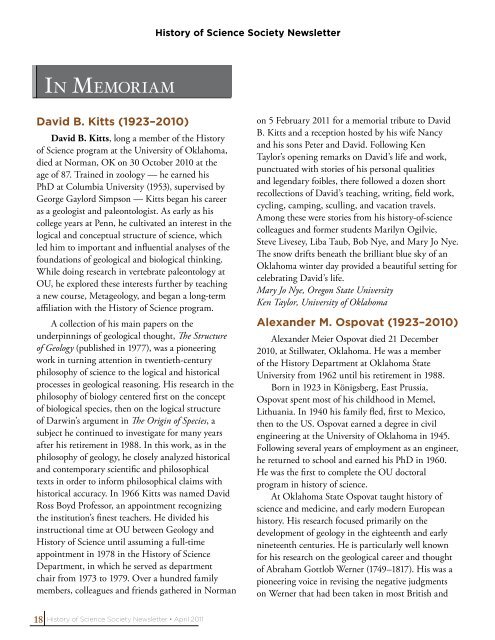Printer friendly version of Newsletter - History of Science Society
Printer friendly version of Newsletter - History of Science Society
Printer friendly version of Newsletter - History of Science Society
You also want an ePaper? Increase the reach of your titles
YUMPU automatically turns print PDFs into web optimized ePapers that Google loves.
<strong>History</strong> <strong>of</strong> <strong>Science</strong> <strong>Society</strong> <strong>Newsletter</strong><br />
In Memoriam<br />
David B. Kitts (1923–2010)<br />
David B. Kitts, long a member <strong>of</strong> the <strong>History</strong><br />
<strong>of</strong> <strong>Science</strong> program at the University <strong>of</strong> Oklahoma,<br />
died at Norman, OK on 30 October 2010 at the<br />
age <strong>of</strong> 87. Trained in zoology — he earned his<br />
PhD at Columbia University (1953), supervised by<br />
George Gaylord Simpson — Kitts began his career<br />
as a geologist and paleontologist. As early as his<br />
college years at Penn, he cultivated an interest in the<br />
logical and conceptual structure <strong>of</strong> science, which<br />
led him to important and influential analyses <strong>of</strong> the<br />
foundations <strong>of</strong> geological and biological thinking.<br />
While doing research in vertebrate paleontology at<br />
OU, he explored these interests further by teaching<br />
a new course, Metageology, and began a long-term<br />
affiliation with the <strong>History</strong> <strong>of</strong> <strong>Science</strong> program.<br />
A collection <strong>of</strong> his main papers on the<br />
underpinnings <strong>of</strong> geological thought, The Structure<br />
<strong>of</strong> Geology (published in 1977), was a pioneering<br />
work in turning attention in twentieth-century<br />
philosophy <strong>of</strong> science to the logical and historical<br />
processes in geological reasoning. His research in the<br />
philosophy <strong>of</strong> biology centered first on the concept<br />
<strong>of</strong> biological species, then on the logical structure<br />
<strong>of</strong> Darwin’s argument in The Origin <strong>of</strong> Species, a<br />
subject he continued to investigate for many years<br />
after his retirement in 1988. In this work, as in the<br />
philosophy <strong>of</strong> geology, he closely analyzed historical<br />
and contemporary scientific and philosophical<br />
texts in order to inform philosophical claims with<br />
historical accuracy. In 1966 Kitts was named David<br />
Ross Boyd Pr<strong>of</strong>essor, an appointment recognizing<br />
the institution’s finest teachers. He divided his<br />
instructional time at OU between Geology and<br />
<strong>History</strong> <strong>of</strong> <strong>Science</strong> until assuming a full-time<br />
appointment in 1978 in the <strong>History</strong> <strong>of</strong> <strong>Science</strong><br />
Department, in which he served as department<br />
chair from 1973 to 1979. Over a hundred family<br />
members, colleagues and friends gathered in Norman<br />
on 5 February 2011 for a memorial tribute to David<br />
B. Kitts and a reception hosted by his wife Nancy<br />
and his sons Peter and David. Following Ken<br />
Taylor’s opening remarks on David’s life and work,<br />
punctuated with stories <strong>of</strong> his personal qualities<br />
and legendary foibles, there followed a dozen short<br />
recollections <strong>of</strong> David’s teaching, writing, field work,<br />
cycling, camping, sculling, and vacation travels.<br />
Among these were stories from his history-<strong>of</strong>-science<br />
colleagues and former students Marilyn Ogilvie,<br />
Steve Livesey, Liba Taub, Bob Nye, and Mary Jo Nye.<br />
The snow drifts beneath the brilliant blue sky <strong>of</strong> an<br />
Oklahoma winter day provided a beautiful setting for<br />
celebrating David’s life.<br />
Mary Jo Nye, Oregon State University<br />
Ken Taylor, University <strong>of</strong> Oklahoma<br />
Alexander M. Ospovat (1923–2010)<br />
Alexander Meier Ospovat died 21 December<br />
2010, at Stillwater, Oklahoma. He was a member<br />
<strong>of</strong> the <strong>History</strong> Department at Oklahoma State<br />
University from 1962 until his retirement in 1988.<br />
Born in 1923 in Königsberg, East Prussia,<br />
Ospovat spent most <strong>of</strong> his childhood in Memel,<br />
Lithuania. In 1940 his family fled, first to Mexico,<br />
then to the US. Ospovat earned a degree in civil<br />
engineering at the University <strong>of</strong> Oklahoma in 1945.<br />
Following several years <strong>of</strong> employment as an engineer,<br />
he returned to school and earned his PhD in 1960.<br />
He was the first to complete the OU doctoral<br />
program in history <strong>of</strong> science.<br />
At Oklahoma State Ospovat taught history <strong>of</strong><br />
science and medicine, and early modern European<br />
history. His research focused primarily on the<br />
development <strong>of</strong> geology in the eighteenth and early<br />
nineteenth centuries. He is particularly well known<br />
for his research on the geological career and thought<br />
<strong>of</strong> Abraham Gottlob Werner (1749–1817). His was a<br />
pioneering voice in revising the negative judgments<br />
on Werner that had been taken in most British and<br />
18 <strong>History</strong> <strong>of</strong> <strong>Science</strong> <strong>Society</strong> <strong>Newsletter</strong> • April 2011
















